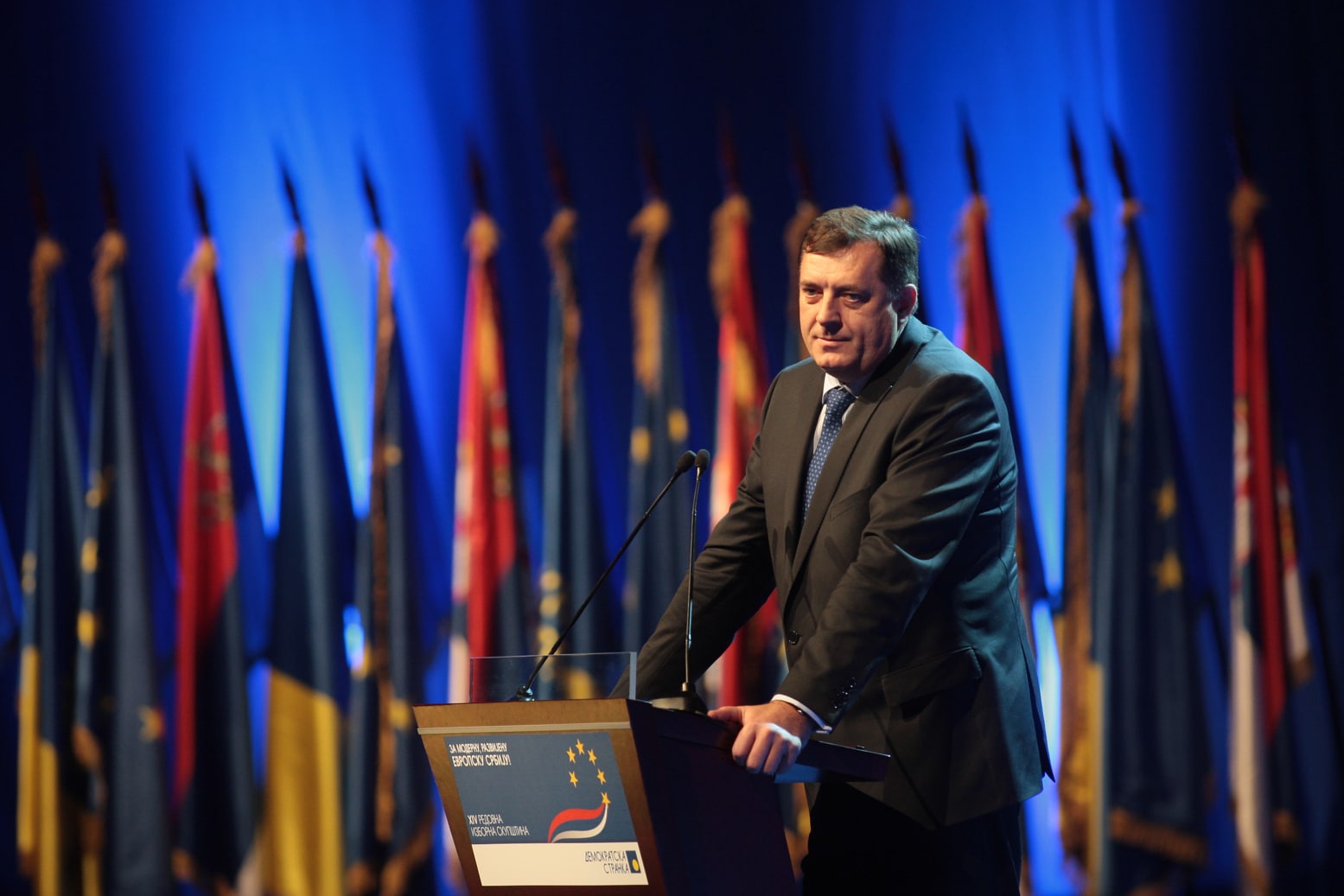Milorad Dodik 2014
The parliament of Republika Srpska has voted to stop the ethnic Serb entity’s participation in the Constitutional Court of Bosnia-Herzegovina amid rising tensions with the central government over a property law. Bosnian Serb leader Milorad Dodik has threatened numerous times to push for the independence of Republika Srpska unless the clash over the country’s assets will be in favor of the Serbian region. This new action of the Republika are seen as a new attempt to destabilize the central Bosnian state.
The reason for their decision, according to the representatives of the ruling parties, is the “Anti-Dayton and “anti-constitutional” action of the Constitutional Court of Bosnia and Herzegovina refering to the decision of that court on the property law. This came after Bosnian Serb leader Milorad Dodik mentioned the merging of the Serb half of Bosnia with Serbia amid the rising tensions over the contested property law. He said: “We cannot live in Bosnia-Herzegovina, which strangles us and threatens our freedoms”. “All the people here must take ownership of the idea we have, to proclaim RS a country and unite it with Serbia. We are not making a country on someone else’s territory. This is our country, our property, our freedom,” he added.
The Constitutional Court of Bosnia and Herzegovina responded and condemned the “unconstitutional actions by the National Assembly of Reblika Srpska” and states that the Serbian entity “exerts strong pressure on the independence of the Constitutional court”.
Property law
The Republika Srpska have been trying to implement a property law for over two years. If the law gets implemented it would mean that properties that are used by institutions of Republika Sprska, like public institutions, self-government units and other public services that are established by the entity would become exclusively Republika Srpska’s property. Dodik says that the current law that is valid across whole Bosnia, “deprives the Serb region in Bosnia of the right to its lands, rivers and forests.” However, the country’s constitutional court has repealed the law twice and states that the national parliament must adopt a property law that would be valid across Bosnia and not one of the country’s two entities. The implementation of the law has also been annulled by Christian Schmidt, the High Representative of the international community, who is the international overseer of the implementation of Bosnia and Herzegovina’s peace agreement. He used his so-called ‘Bonn powers’ to temporarily suspend the property law.
Bonn powers
When the Bosnian War ended because of the 1995 Dayton accords, an administrative system was established under which the Bosnian state is partitioned between Republika Srpska and the Muslim Bosniak-Croat Federation, who have their own parliament and governing bodies and are overseen by a state-level government. These three ethnic groups have their own member of the triple presidency. Christian Schimdt introduced numerous changes to the constitution of the Federation’s entity, which allowed the prime minister to be approved by the two houses of the parliament, even if one of the entity’s vice-presidents refuses to back the nominee. He also introduced the possibility of a snap election in case of a blocking of the process by representatives of any of the three main ethnic groups or major political parties. Schmidt said that he was pushed to make this decision after the winning parties in the elections were unable to form an entity government for six month. He said: “We must say that we are witnessing a political deadlock and that is not a conflict between the constituent nations. However, the will of the citizens expressed in the election must not be ignored”. However, the citizens of Bosnia Herzegovina, where not happy with his intervention. Critics of Schmidt believes he is actively trying to weaken the Bosniak votes in the country. This lays sensitive since the Bosniak ethnic group were victim to extensive ethnic cleansing during the war.
Reaction from the EU
Tobias Billstroem, the foreign minister of Sweden who currently holds the EU Presidency, said that the numerous threats by Bosnian Serb leaders, of secession from the rest of Bosnia-Herzegovina are unacceptable and are intensifying already high tensions in the region. He further added: “Renewed threats of secession coming from Republika Srpska are unacceptable, groundless and contribute to a climate of distrust and tension at the time of crisis in Europe when what is needed is stability and cooperation”. He also said that the if the draft laws were adopted, it “would be a step backwards for Bosnia-Herzegovina’s European path”.
In recent years, Serbian leader Milorad Dodik and Republika Sprska have increasingly becoming more pro-Serbian. This creates the danger of destabilising the structure that was supposed to maintain the balance between BiH’s three major population groups. If they are continuing this progress, they disrupt Bosnia and Herzegovina. This in turn can also disrupt the wider region and BiH’s process towards EU accession – having EU candidate status since last year.
author: Manouk Bronzwaer



